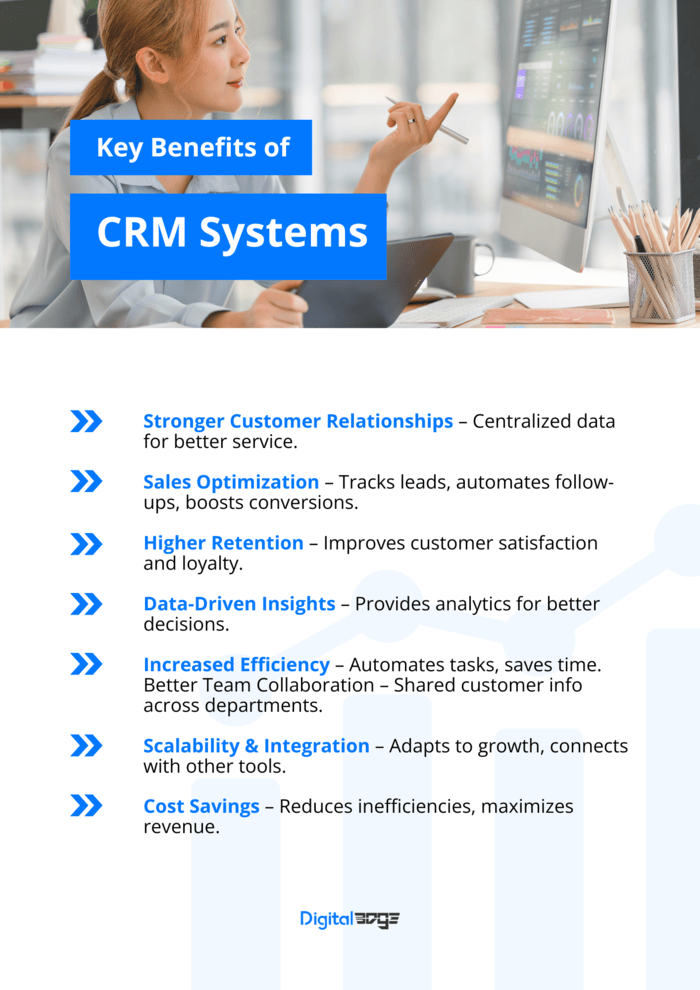In today’s fast-paced and digitally driven world, businesses across industries are undergoing significant transformations to remain competitive and meet evolving customer expectations.
At the heart of this shift lies digital transformation – an umbrella term encompassing the integration of digital technology into various aspects of a business to improve efficiency, enhance customer experiences, and drive growth.
A key component of this transformation is the effective use of Customer Relationship Management (CRM) systems. Modern CRM platforms have evolved beyond traditional contact management, offering robust tools to streamline business operations, optimize workflows, and harness data-driven insights that fuel long-term success.
Understanding the Role of CRM in Digital Transformation
Digital transformation goes beyond adopting new technologies; it involves rethinking how businesses deliver value to customers and operate internally. CRM systems play a central role in this by serving as a hub for customer-centric data and activities.
Unlike traditional methods where customer data may be fragmented across departments, modern CRMs provide a unified view of each customer, ensuring that businesses can deliver seamless and personalized experiences.
By consolidating data from various touchpoints – emails, social media interactions, sales calls, and customer support queries – CRMs enable teams to collaborate effectively and offer a cohesive customer experience.
This unified approach allows businesses to break down internal silos and foster cross-departmental collaboration, an essential aspect of digital transformation. For companies looking to implement and customize CRM solutions effectively, working with a Certified Zoho Partner can provide valuable expertise and guidance throughout the process.
1. Streamlining Operations Through Workflow Automation
One of the key ways CRM systems drive digital transformation is by automating repetitive and time-consuming tasks. Automation within CRMs can streamline everything from lead management and follow-ups to invoicing and performance tracking.
For example, when a potential customer submits an inquiry through a company’s website, the CRM can automatically create a new lead, assign it to the appropriate sales representative, and schedule follow-up reminders – all without manual intervention.
This level of automation helps minimize errors, reduce administrative overhead, and ensure that no opportunities are missed. By automating routine tasks, businesses can allocate resources more efficiently and focus on high-impact, strategic activities.
Additionally, CRMs often integrate seamlessly with marketing tools, allowing businesses to automate personalized email campaigns, nurture leads, and monitor performance in real-time.
2. Enhancing Customer Interactions with Personalization
In today’s world, where customers expect personalized interactions, CRMs play a crucial role in delivering tailored experiences. By analyzing customer data—such as purchase history, preferences, and previous interactions—businesses can anticipate customer needs and customize their offerings. This level of personalization is essential for building long-term relationships and boosting customer loyalty.
For example, a retail business using a CRM can identify customers who have shown interest in certain products and send them targeted offers or recommendations. Similarly, a SaaS company can leverage CRM insights to provide proactive support or suggest upgrades based on a customer’s usage patterns.
With built-in analytics and AI-powered tools, modern CRMs help businesses gather actionable insights, enabling data-driven decisions that enhance the overall customer experience.
3. Data-Driven Insights for Strategic Decision-Making
One of the key benefits of implementing a CRM system as part of a digital transformation strategy is access to comprehensive, real-time data. In today’s data-driven world, businesses generate vast amounts of information, but without proper analysis, this data holds little value. Modern CRMs are equipped with powerful analytics tools that transform raw data into actionable insights.
These insights help businesses identify trends, measure the effectiveness of marketing campaigns, forecast sales, and improve customer retention rates.
For example, if a CRM reveals that a specific customer segment responds well to a particular marketing campaign, businesses can allocate more resources to that campaign and replicate its success elsewhere. Additionally, predictive analytics within CRMs can anticipate future customer behavior, enabling businesses to make proactive decisions and minimize risks.
4. Breaking Down Silos and Promoting Collaboration
Digital transformation requires businesses to eliminate internal silos and build an interconnected ecosystem where departments work together seamlessly.
CRMs serve as a bridge between sales, marketing, customer support, and other teams by providing a shared database of customer information. When all departments have access to the same data, collaboration improves, and teams can deliver consistent messages across all customer touchpoints.
For instance, if a customer raises a support ticket, the support team can access details like the customer’s purchase history, previous interactions, and any ongoing sales discussions through the CRM.
This comprehensive view allows the team to resolve issues quickly and personalize their responses, creating a better customer experience. CRMs also include collaboration tools that enable teams to share updates, track project progress, and set goals, fostering a more cohesive and productive working environment.
5. Scalability and Integration with Other Digital Tools
A successful digital transformation strategy must be scalable and adaptable to evolving business needs. Modern CRMs provide extensive integration capabilities, allowing businesses to connect seamlessly with various digital tools and systems, such as marketing automation platforms, e-commerce websites, accounting software, and project management tools.
This interconnected ecosystem ensures smooth data flow across the organization, eliminating redundancies and boosting overall efficiency.
For example, integrating a CRM with an email marketing platform enables businesses to monitor customer responses directly within the CRM. Sales teams can then prioritize leads and tailor their outreach based on this data.
CRMs also support scalable growth by accommodating larger datasets, more users, and increasing workflow complexity as the business expands. This scalability ensures that the CRM remains a valuable resource, supporting long-term growth and digital transformation initiatives.
6. Enhancing Customer Retention and Lifetime Value
Digital transformation isn’t just about attracting new customers – it’s equally focused on retaining existing ones and increasing their lifetime value.
CRMs provide businesses with the tools to build long-term relationships through regular engagement and personalized support. By tracking customer interactions and feedback, businesses can identify issues early and address them proactively, helping to reduce churn rates.
For example, a CRM can automatically send follow-up emails after a purchase, offering assistance or requesting feedback. If negative feedback is received, the system can alert the relevant team to take swift action, demonstrating the business’s dedication to customer satisfaction.
By consistently improving the customer experience, businesses can foster loyalty and encourage repeat purchases, ultimately maximizing customer lifetime value.
Conclusion: A Strategic Pillar for Long-Term Success
Incorporating a CRM system into a business’s digital transformation strategy is no longer optional – it’s essential for companies seeking sustainable growth and a competitive edge.
By streamlining operations, enhancing customer interactions, and leveraging data-driven insights, CRMs enable businesses to adapt to changing market conditions and exceed customer expectations.
With their flexibility, scalability, and advanced features, modern CRMs can support businesses of all sizes and industries. As companies continue to evolve, CRMs will remain a key driver of innovation, efficiency, and long-term success.


